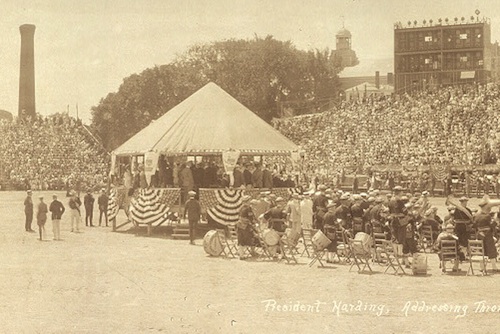
President Harding speaking on the 300th Anniversary, arriving at the reenactment pageant and ceremonies in the Presidential yacht, the Mayflower, the following summer, 1921. Vice President Coolidge would speak on that occasion as well. Photo courtesy of the New England Historical Society.
Given nearly ninety-seven years ago, outgoing Massachusetts Governor and Vice-President-elect Calvin Coolidge had cogent observations on those who now almost 400 years ago first encountered the desolate, windswept shores of Cape Cod to establish the Plimouth Plantation. The 102 passengers aboard the Mayflower, finding selfless collaboration necessary between its mix of Saint and Stranger, their ranks decimated by sickness and the onset of winter, pledged themselves to solemn Compact and clung tenaciously on to ideals that would, with time, sprout all across America.
Samoset’s equally intrepid walk into the colony and the resulting partnership between Plimouth and the Wampanoag gave practical demonstration to the depth of faith and fidelity that withstood all challenges. Pressed on all sides and yet not crushed, surrounded by death and the prospect of it yet not destroyed, they labored onward together even when larger, more aggressive neighbors sought to exterminate them, poised to show the epitome of intolerance; while it was the Plimouth colonists who showed the will to defend the lives of the innocent, including their native friends.
The head of the violent chief Wituwamat, displayed on a pike along the colony’s wall, and a bloody flag accompanying it were symbols of this rugged determination to defend life and do what is necessary to confront those who would take it wantonly and mercilessly. Massasoit, saved by the medical care of the colonists from serious illness, along with Samoset and Tisquantum understood this distinction and were thankful for their steadfast friends at Plimouth. Sadly, Massasoit’s son Metacomet (the future “King Philip”) would repudiate this exceptional partnership and go to war to rid the region of outsiders once for all. It was King Philip’s intolerant notion that only one race belonged and all others were unwelcome that inflicted yet more needless loss on both sides.
As Americans gathered in 1920 where that remarkable colony began to commemorate the landing, Coolidge would declare of those Pilgrims, “They came not merely from the shores of the Old World. It will be in vain to search among recorded maps and history for their origin. They sailed up out of the infinite.
“There was among them small trace of the vanities of life. They came undecked with orders of nobility. They were not children of fortune but of tribulation. Persecution, not preference, brought them hither; but it was a persecution in which they found a stern satisfaction. They cared little for titles; still less for the goods of this earth; but for an idea they would die. Measured by the standards of men of their time, they were the humble of the earth. Measured by later accomplishments, they were the mighty. In appearance weak and persecuted they came rejected, despised an insignificant band; in reality strong and independent, a mighty host of whom the world was not worthy, destined to free mankind. No captain ever led his forces to such a conquest. Oblivious to rank, yet men trace to them their lineage as to a royal house.
“Forces not ruled by man had laid their unwilling course. As they landed, a sentinel of Providence, humbler, nearer to nature than themselves, welcomed them in their own tongue. They came seeking only an abiding-place on earth, ‘but lifted up their eyes to heaven, their dearest country,’ says Governor Bradford, ‘where God hath prepared for them a city.’ On that abiding faith has been reared an empire, magnificent beyond their dreams of Paradise.
“Amid the solitude they set up hearthstone and altar; the home and the church. With arms in their hands they wrung from the soil their bread. With arms they gathered in the congregation to worship Almighty God. But they were armed, that in peace they might seek divine guidance in righteousness; not that they might prevail by force, but that they might do right though they perished.
“What an increase, material and spiritual, three hundred years has brought that little company is known to all the earth. No like body ever cast so great an influence on human history. Civilization has made of their landing-place a shrine. Unto the Commonwealth of Massachusetts has been entrusted the keeping of that shrine. To her has come the precious heritage. It will be kept as it was created, or it will perish, not with an earthly pride but with a heavenly vision.
“Plymouth Rock does not mark a beginning or an end. It marks a revelation of that which is without beginning and without end a purpose, shining through eternity with a resplendent light, undimmed even by the imperfections of men; and a response, an answering purpose, from those who, oblivious, disdainful of all else, sailed hither seeking only for an avenue for the immortal soul.”
We are the children of those Pilgrims not because we share in some particular bloodline or can claim direct ancestry to these regal men and women but because we share their resolve through hardship, their humility through selfless collaboration, and their faith in things unseen. We are living pilgrims aspiring to the same heavenly country they did.